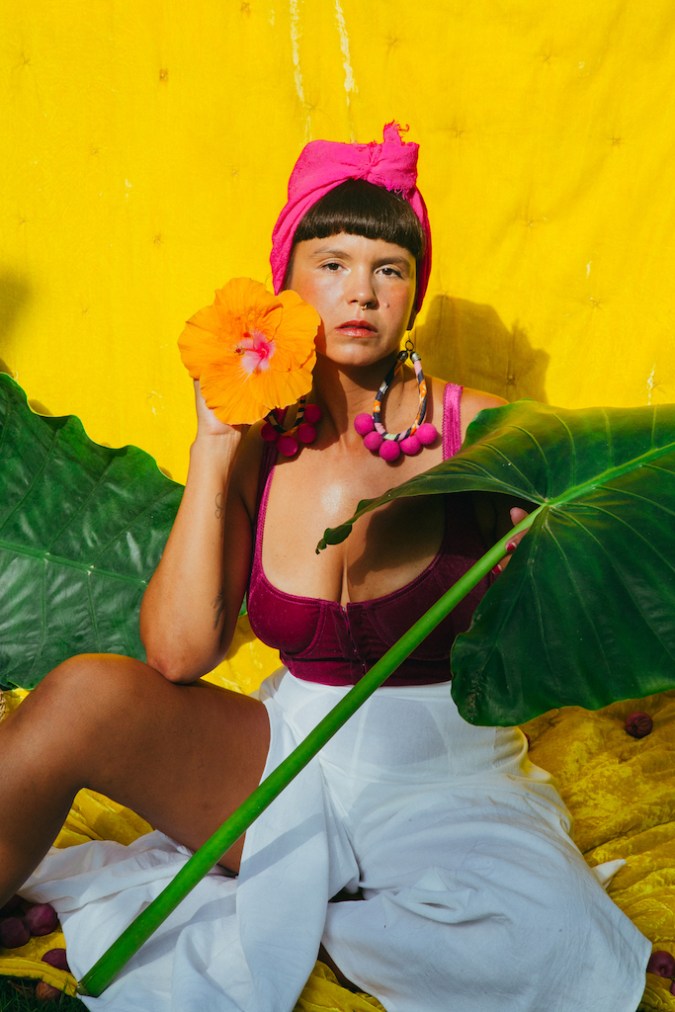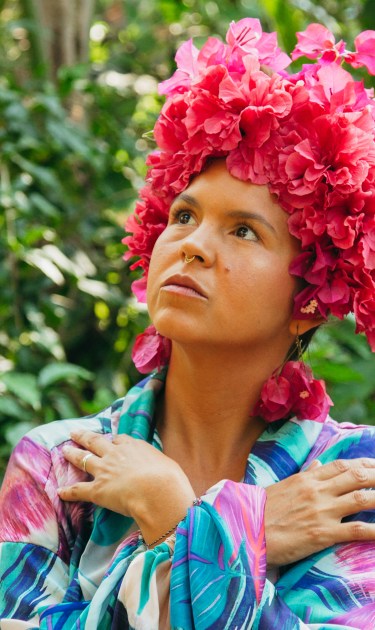Stepping into Bomba Estéreo’s dressing room Li Saumet, the lead singer, is adorned in a coat boasting all the colors of the rainbow. Despite braving the chilly 50 degrees Fahrenheit, she imparts a warm and welcoming presence beneath the colorful coat and the blue suede puffer jacket cozily wrapped over her legs. The clock, ticking just above her head, reads 7:34 p.m. In roughly two hours, Saumet and her group are set to headline the second annual Bésame Mucho, a Spanish-language music festival featuring classic acts like Maná and Los Bukis this year.
In anticipation of her performance, Remezcla got the chance to sit down with Saumet for a candid discussion. As we delved into various topics, Saumet shared insights into her spiritual practices, her latest partnership with Dove, and why it’s important to her to celebrate Indigenous culture.
Read more, below.
This interview has been edited and condensed for clarity.

Finding Her Spiritual State
Remezcla: How integral is your spirituality to your music?
Li Saumet: More and more every time—there’s so much more consciousness every time. For me, music and spirituality have always been one. Your music changes when you’re in a different spiritual state.
If you’re disconnected spiritually, your music will also be disconnected. Your music will also be more connected if you’re deeply connected spiritually. At this moment, those two things are quite balanced for me — and I think you can feel that.
And you feel that?
Yes. Yes.
What do your spirituality practices look like?
Well, I have a routine that’s very… strict. (laughs) I wake up very early in the morning.
At what time?
At 4:44.
Oh, very spiritual. I see you.
(chuckles) After I wake up, I’ll exercise, take my son to school, then exercise some more. I try to pray. Right now, I’m saying a lot of rosaries. I’ll meditate. Currently, I’m doing an ice practice—it’s basically a 10-minute ice bath. I’ll do a lot of breathwork, too.
I also try to connect more with the elements. Daily, I’m trying to live in accordance with my spiritual beliefs. And that goes beyond praying, like trying not to judge people and just being in harmony.

Breaking Hair Stereotypes
What stereotypes did you grow up believing, and how did you break free from them?
Latinos, vwe look different and have all different hair types: curly, straight, and wavy. We are Indigenous. We are Black. We are white. All of those identities should be a pride point and celebrated equally, but they’re not.
I also feel that, as women, our physical attributes—not just our hair but also our bodies—are always subject to society’s beauty standards. In a way, we’ve each felt like we’re not good enough because we don’t meet those standards. They’ve made us believe that we have to be the same, and that’s strange—like, wanting to be exactly the same as someone else is strange. In reality, the most beautiful thing is that we all have something that someone else doesn’t have, that we are all different.
Tell me about your partnership with Dove, which is dubbed #MyHairAMiModo. What about this campaign, specifically, spoke to your soul?
These campaigns are super important in helping us change a little of that mindset that we have to be the same. It’s celebrating our differences.
What do you hope that Latine people take away from this campaign?
I was a strange kid, and people always criticized me for it. Now, I thank God every day for making me strange—because being strange is what made me view the world differently. I see my strangeness as a strength because I did things others couldn’t have done.
Again, those differences, exiting the standard, are what makes us special.
Embracing Indigenous Roots & Celebrating Identity
As a Latina, I know you find it crucial to celebrate Indigenous culture. Why do you feel that’s the case?
Indigenous people came first. They’re our ancestors. Additionally, they have a respect for nature that’s much bigger than that of other people, who may not have any respect for nature. Indigenous people are our parents, grandparents, and wise elders. They gave us a path, and we forget about that.
For me, it’s fundamental to return to our Indigenous roots. I take a lot of pride in my Indigenous roots. [These communities] know how to manage their relationship with plants and medicine, which are one and the same for them. They follow the natural order. That leads to being proud of your own natural order, which is Indigenous blood coursing through our veins.
I’ve always said that people are like trees. If a tree is very connected to its roots and its roots run deep, that tree will grow more. If the roots are weak and aren’t one with the land, that tree’s leaves will start to wither. Our roots are our parents, our grandparents, our family, our neighborhoods, our music, our culture, our language.
I showcase my heritage of healing through music, which comes from my ancestors.
How do you celebrate your own Indigenous roots?
With this (embracing her hair and bangs). I showcase my heritage of healing through music, which comes from my ancestors. I try to write music that frees and helps people, music that has a message. I want to make people happy.
My clothes, my hair, my accessories, and everything I do in my shows—that also honors Indigenous people. The show [at Bésame Mucho] is very psychedelic. It has themes of ayahuasca, medicine, Latin America—and it’s very Indigenous, more and more each time.
Showtime
Speaking of the show, which song are you most excited to perform tonight?
I get excited to perform all the songs. But if I had to pick one, I’d go with “Soy Yo.” That song has an energy that connects with a lot of people.
And you did a remix of that song for the campaign with Dove.
Yes, exactly.
Before we go, is there anything else you want to add?
Just that we have to be loyal to the people we love and that we have to do things our own way, not someone else’s way.




